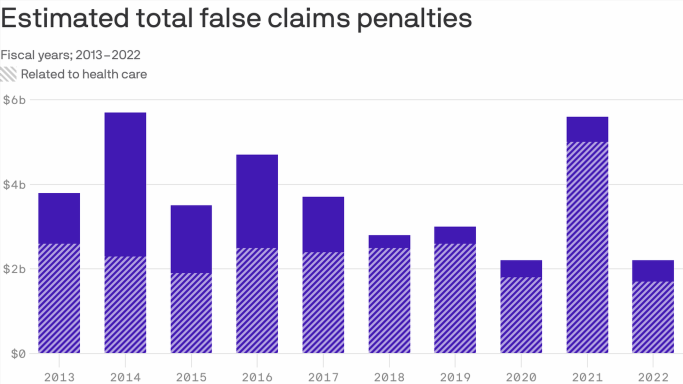The Supreme Court today will look at whether national pharmacies run by Safeway and SuperValu violated the government's flagship anti-fraud law — or whether the law's requirements are too unclear to hold the chains accountable.
Why it matters: Billions of dollars are at stake in the case, which pivots around the False Claims Act, a key tool used since the Civil War to penalize those who knowingly defraud the U.S. government. The law has driven scores of whistleblower complaints against health care companies for defrauding Medicare and other alleged misconduct.
How it works: The government can bring a case, or private individuals can launch 'qui tam' suits on behalf of the government which allows the whistleblower to keep a share of any money recovered in the case
- Settlements and judgments under the False Claims Act topped $2.2 billion last year, including about $1.7 billion from health-related cases.
- The government has recovered more than $72 billion since 1986 when Congress strengthened the law.
- But legal challenges have brought into question how to establish if companies knowingly intended to bilk the government.
Catch up quick: The potentially "game-changing case" started in 2006, when Walmart began offering deep discounts on commonly used drugs, according to NPR.
- In an effort to compete, SuperValu and Safeway extended discounts and price-matching deals to cash-paying customers, but charged Medicare and Medicaid the customary prices for the medicines. Whistleblowers in both instances alleged the chains knowingly cheated Medicare and Medicaid out of $200 million, Bloomberg Law reported.
- The 7th U.S. Circuit Court of Appeals ruled the companies had not "knowingly" made false claims and misinterpreted the law in the absence of solid guidance. The whistleblowers appealed to the Supreme Court with support from the government, 33 states and Iowa Sen. Chuck Grassley, who was instrumental in revising the law.
What they are saying: "If the Supreme Court chooses to adopt a clear, objective standard, defendants may be able to rely on reasonable interpretations of murky regulations as a defense," wrote Brett Johnson, a partner, and Claudia Stedman, an associate, of the law firm Snell & Wilmer for Reuters.
- "An objective standard could serve as protection for honest contractors who may otherwise be subject to liability for failing to comply with complex regulations," they wrote.
The big picture: The case is being closely watched in health business circles and provided common ground for traditional adversaries like the American Hospital Association and health insurer group AHIP.
- Last month, they filed a joint amicus brief to the court, saying the government's argument that SuperValu and Safeway should be held accountable caused great "concern" because it would "impose criminal or civil FCA liability even though it admits that it cannot 'feasibly address in advance every potential ambiguity' in its thousands of statutes of regulations."
- "The rule it proposes would create a Wild West of ramifications for any well-intentioned and legitimate hospital or insurance provider that seeks to serve Americans in partnership with the government," they wrote.
Yes, but: Other legal experts say the case could "cripple [the government's] ability to prosecute and deter fraud."
- "If the Supreme Court affirms the Seventh Circuit's decision, the Act's intimidating penalties and extremely effective qui tam suits will be diluted beyond judicial repair," per Kohn, Kohn & Colapinto.
- "The plaintiff’s bar is worried, and more importantly, everyone should be worried if the Supreme Court upholds this case," Tony Munter, an attorney with Price Benowitz told Bloomberg Law.
- "The idea that you can know you are lying to the government, take the government's money, and then later come up with an excuse which is wrong, but try to claim that excuse is either reasonable or objective is an attempt to avoid liability we should all abhor," he said.
They are joined in their alarm by Grassley, who led the 1986 charge to strengthen the False Claims Act. "It's just contrary to what we intended," Grassley told NPR. "That test just makes a hash of the law of fraud."
What to watch: A ruling for stricter standards in bringing charges under the False Claims Act could drive new attempts in Congress to overhaul the law, according to SCOTUS Blog.
Don't forget: The court also heard another False Claims Act case in December.
Source: Read Full Article
